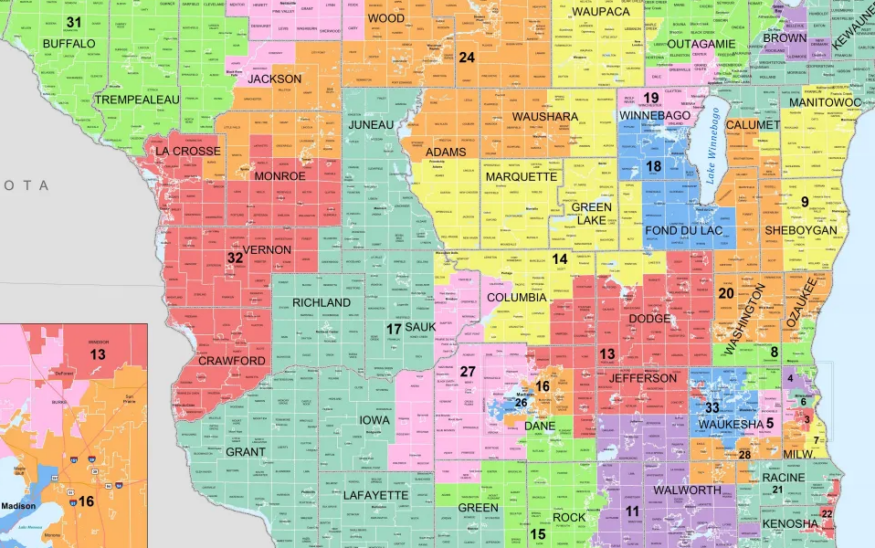WisDems unlikely to fully control state government
By: Bridgetower Media Newswires//February 12, 2024//
WisDems unlikely to fully control state government
By: Bridgetower Media Newswires//February 12, 2024//
By Peter Cameron, THE BADGER PROJECT
Politically debilitated since 2011 by what many experts call some of the most flagrant gerrymandering in the country, Wisconsin Democrats are salivating over the prospect of more competitive political districts for the state legislature in 2024.
But only one of the four sets of maps submitted by Democrats or their allies to the Wisconsin Supreme Court projects the party winning a majority in the state Senate if they win a majority of the vote in 2024, experts say. The others could still see Republicans hold the state Senate in that event.
Perhaps sensing this, Republicans announced Wednesday that they would consider accepting the maps submitted by Gov. Tony Evers, a Democrat. His districts project to give Democrats more seats than they have now, but not a majority in the state Senate.
Democrats need to win majorities in the state Assembly and the state Senate, and have a Democratic governor, to be able to pass legislation without the help of Republicans. The GOP has controlled both houses of the legislature for 13 years and has a supermajority in the state Senate and a near super majority in the state Assembly.
For more than a decade, Democrats have frequently won majorities of the vote in all races for the legislature, only to see themselves lose a majority of the seats.
The state Supreme Court is expected to enact new maps soon, in part to aid election clerks’ preparation for the 2024 elections.
Regardless of whichever maps are adopted, Republicans will likely hold an advantage in 2025, as half the state Senate seats will have been elected under the old, partisan-skewed maps that the GOP drew.
That’s a product of the election cycle: state Senate terms are four years, but races are timed so that half the 33 seats come up for election every two years. The result is that Democrats have an uphill battle to win control of the upper house in 2024.
The 99 members of the lower house of the legislature, the state Assembly, run for reelection every two years, so every member would have to run again in 2024 under more competitive maps.
Attorneys allied with Democrats had asked the high court to put every Senate district on the ballot in 2024 so the elections would have to be held under the new political maps. The court refused.
Joe Heim, a political science professor emeritus at UW-La Crosse, called that request from Democrats “unreasonable,” noting that senators who won in 2022 earned their 4-year terms.
So because the enacting of new political districts will only force half the state Senate to run in more competitive maps in 2024, while the other half of senators will have been elected from the Republican-drawn districts, three of the four sets of maps submitted by Democrats and their allies are unlikely to deliver a majority for their party if they win a majority of the vote.

But one might.
State Senate districts are numbered 1 through 33. The even-numbered districts are up for reelection in 2024.
Since the map submitters are mostly drawing new districts, as opposed to tweaking old ones, they can decide when each Senate district votes by assigning it an even or odd district number, said John Johnson, a research fellow at Marquette Law School who specializes in redistricting.
The set of districts submitted by the Democratic-aligned, Madison-based law firm Boardman Clark seems to have given this issue the most thought, Johnson said.
Their maps tweaked the district numbers to potentially create the most representative maps for the 2024 election, Johnson noted. The law firm argued to the court that its maps are the only ones in which Democrats could win a majority in the state Senate if they win a majority of the votes. The law firm projects Republicans to hold the state Senate in all the other maps, even if Democrats win a majority of the vote.
In addition to the four Democratically-drawn sets of districts, Republicans submitted two sets of maps. But consultants hired by the left-leaning majority of the Supreme Court called the GOP-drawn maps “political gerrymanders,” a characterization that likely kills chances the court will enact them.
The fear that the left-leaning court will choose the Boardman Clark maps and face the potential of state government completely flipping may be leading Republicans to announce they would consider enacting maps by the governor. It might be the best they can get.
With those maps, “I would expect that the Democrats would gain seats but are not at all likely to become the majority party in the Senate,” Heim said.
The consultants hired by the court to evaluate the submitted districts, two academics from Carnegie Mellon Insitute and UC Irvine, have also offered to tweak any of the sets of maps, or draw their own, if the court orders it.
The Badger Project is a nonpartisan, citizen-supported journalism nonprofit in Wisconsin.
This article first appeared on The Badger Project and is republished here under a Creative Commons license.
Legal News
- Wisconsin attorney loses law license, ordered to pay $16K fine
- Former Wisconsin police officer charged with 5 bestiality felony counts
- Judge reject’s Trump’s bid for a new trial in $83.3 million E. Jean Carroll defamation case
- Dozens of deaths reveal risks of injecting sedatives into people restrained by police
- The Latest: Supreme Court arguments conclude in Trump immunity case
- Net neutrality restored as FCC votes to regulate internet providers
- Wisconsin Attorney General asks Congress to expand reproductive health services
- Attorney General Kaul releases update at three-year anniversary of clergy and faith leader abuse initiative
- State Bar leaders remain deeply divided over special purpose trust
- Former Wisconsin college chancellor fired over porn career is fighting to keep his faculty post
- Pecker says he pledged to be Trump campaign’s ‘eyes and ears’ during 2016 race
- A conservative quest to limit diversity programs gains momentum in states
WLJ People
- Power 30 Personal Injury Attorneys – Russell Nicolet
- Power 30 Personal Injury Attorneys – Benjamin Nicolet
- Power 30 Personal Injury Attorneys – Dustin T. Woehl
- Power 30 Personal Injury Attorneys – Katherine Metzger
- Power 30 Personal Injury Attorneys – Joseph Ryan
- Power 30 Personal Injury Attorneys – James M. Ryan
- Power 30 Personal Injury Attorneys – Dana Wachs
- Power 30 Personal Injury Attorneys – Mark L. Thomsen
- Power 30 Personal Injury Attorneys – Matthew Lein
- Power 30 Personal Injury Attorneys – Jeffrey A. Pitman
- Power 30 Personal Injury Attorneys – William Pemberton
- Power 30 Personal Injury Attorneys – Howard S. Sicula












